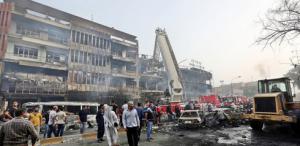TerrorismBaghdad terrorist attack’s death toll reaches 175
Iraqi officials say that the death toll from Saturday’s massive ISIS suicide bombing near two busy shopping malls in Baghdad now stands at 175. The number is going to rise, as more bodies are being recovered from the destroyed and burned-down buildings. Prime Minister Haider al-Abadi ordered the bolstering of security measures in Baghdad and other cities. These measures include the withdrawal of a fake hand-held bomb-detection device which has been used at Iraqi security checkpoints.

ISIS claims responsibility for the Baghdad bombing // Source: theconversation.com
Iraqi officials say that the death toll from Saturday’s massive ISIS suicide bombing near two busy shopping malls in Baghdad now stands at 175. The number is going to rise, as more bodies are being recovered from the destroyed and burned-down buildings. ABC News notes that the number of victims is the highest in a single attack since 2003, when the United States invaded Iraq ad toppled the regime of Saddam Hussein.
A refrigerator truck filled with explosives struck Baghdad’s busy commercial area of Karada late on Saturday.
Iraqi police and health officials warned that there are still people missing and that the death toll could rise further.
In the wake of the attack, people vented their anger at what they described as a corrupt and incompetent government and political leaders. Prime Minister Haider al-Abadi ordered the bolstering of security measures in Baghdad and other cities. These measures include the withdrawal of a fake hand-held bomb-detection device which the Nuri al-Maliki government spent millions of dollars in U.S. aid money to buy. The gulf-ball detectors were bought for $20 each by British businessman James McCormick, who then repackaged them as bomb-detectors, selling them to the Iraqi police and army for $40,000 each.
Al-Abadi also ordered X-ray systems be installed at check points on major roads leading into Baghdad, along with increased aerial scanning and boosted intelligence efforts.
While ISIS has increased its suicide-bombing attacks, it continues to lose territory in Iraq. In late 2014, the height of ISIS power, the Islamist group had controlled nearly one-third of Iraqi territory. The militants now control only about 14 percent, Western intelligence agencies say.
